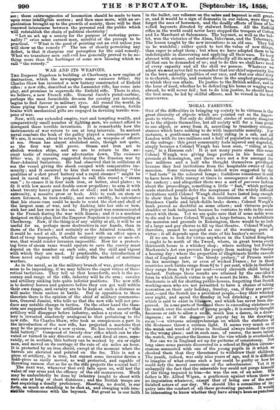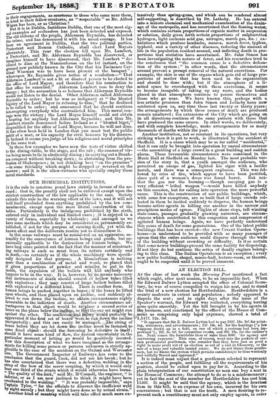MORAL FASHIONS.
ONE of the difficulties in bringing up society to be virtuous is the great diversity of objects which are pointed out as the finger- posts to virtue. Not only do different circles of society disagree as to the objects themselves, but all society will for a time point to one object, or away from it, according to transitory circum- stances which have nothing to do with immutable morality. For instance, a gentleman was seen lately riding in a cab, and all London with its two millions and a half of population was shocked at the outrage : this great community feels injured and degraded, simply because a Colonel Waugh has been seen, " riding at his ease," in a Hansom cab ! It is not many years since this same Colonel Waugh was giving large parties in his house and grounds at Kensington, and there were not a few amongst the two millions and a half who thought themselves privileged because they had invitations from the hospitable owner of that mansion. Some virtuous doubts indeed were suggested by the " bad taste" in the coloured lamps ; fastidious conscience is said to have been a little uneasy at times in consequence of defects in the cookery ; and altogether there was a sort of parvenu fashion about the proceedings, something a little " fast," which perhaps made starched people defer the acceptance of the widely diffused invitations until Colonel Waugh should have lasted long enough to show that he belonged to the institutions of the country. Branksea Castle and brick-fields broke down ; Colonel Waugh's bank proved as doubtful as some others; virtuous people shudder or look indignant because he ventures to ride in the same street with them. Yet we are quite sure that if some noble were to die and to leave Colonel Waugh a large fortune, to rehabilitate the mansion and grounds in Kensington, there would be no lack of a large and gay chorus to fill up that theatre. Colonel Waugh, therefore, cannot be accepted as one of the warning posts of virtue ; it all depends upon the state of his banker's account. If we are to look for virtue anywhere in the United Kingdom it ought to be north of the Tweed, where, in great towns every thirteenth house is a whiskey shop ; where nothing but Forbes Mackenzie's Act can prevent the people from making the Sunday a boozing day; where the proportion of illegitimate births exceeds that of England under " the bloody prelacy," of Prussia under its lax marriage law, or even of wicked France • for in those countries such births range from 6-1-to 7 per cent, while in Scotland they range from 8:7 to 9 per cent—every eleventh child being a bastard. Perhaps these results are attained by the one-idea'd form in which Scotch virtue is apt to assert its laws. Mr. Forbes Mackenzie is all for shutting public-houses, forgetting that Scotch working-men who are not permitted to have a chance of taking recreation on their only holiday, Sunday, can, if they are provi- dent,—and the Scotch are a provident people,—buy their whiskey over night, and spend the *unday in bed drinking; a practice
which is said to exist in G1 w and which has never been dis- proved. In some parts of d there is exceeding strictness in
the watch over the conduct o ung people ; it is scarcely thought decorous or safe to allow a sm , much less a dance, in a draw- iagroom ; as if the deers i-Xf gayety lay in the drawing- roona !—a virtuous misapprehension on which the statistics of tlfe Scotsman throw a curious light. It seems very much as if the watch and ward of virtue in Scotland always turned its eyes to the wrong place; and in such case, of course, the more intent the watch, the greater the license for the vice which is overlooked. Nor can we in England set up for patterns of consistency. Not long since some parents discovered in a school at Brighton dream- stances- eonnected with one of the young pupils in it which so shocked theta that, they threatened to withdraw their children. The youth, indeed, was only nine years of age, and it is difficult to imagine of what crime such a boy could be guilty or hoar he could-defy the moral correction of the schoolmaster. 'Yet it is unhappily the fact that the miserable boy could not purge himself of the thing imputed to him—he was the son of an actor. Ifyi father is Mr. Alfred Wigan, a gentleman against whom there is na imputation whatever, except that of being one of the most finished actors of our day. We should like a committee of in- quiry into the conduct of all these protesting parents. It would be interesting to know whether they have always been as punctual in their engagements, as courteous to those who came near them, as kind to their fellow creatures, as 4. respectable " as Mr. Alfred Wigan has been, or as Christian I' _ But it is in Dublin, fastidious Dublin, that one of the most sig- nal examples ad eviiandum has just been detected and exposed. The old tribune of the people, Alderman Reynolds, has detected the crime, and has denounced it with his usual courage. It has been an agreement in Dublin, that the two political parties, Protestant and Roman Catholic, shall elect Lord Mayors alternately. This year the election fell upon Mr. Lambert, a Protestant, and Mr. Alderman Reynolds -has discovered, or imagines himself to have discovered, that Mr. Lambert " de- clined to dine at the Mausionhouse on the 1st instant, on the ground now publicly known in the City that his Eminence Car- dinal Wiseman was to have been present at the banquet" ; whereupon Mr. Reynolds gives notice of a resolution—. That Alderman Lambert is not a fit or discreet person to be elected to the office of Lord Mayor, and therefore that his nomination to that office be cancelled." Alderman Lambert rose to deny the charge ; but the accusation is so heinous that Alderman Reynolds would not listen to the denial. Other Aldermen called Alderman Reynolds to order ; but he was so indignant at " the bloated bigotry of the Lord Mayor in refusing to dine," that he declined to be called to order; and announced that he should continue interrupting everybody who• contradicted him. This moral cou- rage won the victory ; the Lord Mayor himself could not obtain a hearing for anyliody but Alderman Reynolds ; and thus Mr. Lambert stands denounced before Ireland as a "bloated bigot," disqualified for the office of Lord Mayor,hecause he will not dine. It has often been held in London that you must test the public spirit of a man, or his capacity for civic honours by his dinners. In Ireland it seenas.you judge of his religious and moral principles by the same test.
In these few examples we have seen the tests of virtue shifted to the dining-table, to the strige, and the cab the essence of vir- tue being made to lie in obediently dining ; in carrying out a Brank- sea conquest without breaking d.own ; in abatainmg from the pro- fession of Shakespeare ; in not drinking beer " on the premises " —in some triviality which might be dropped or reversed on the morrow; and it is the ultra-yirtuous who specially employ these moral standards.



























 Previous page
Previous page